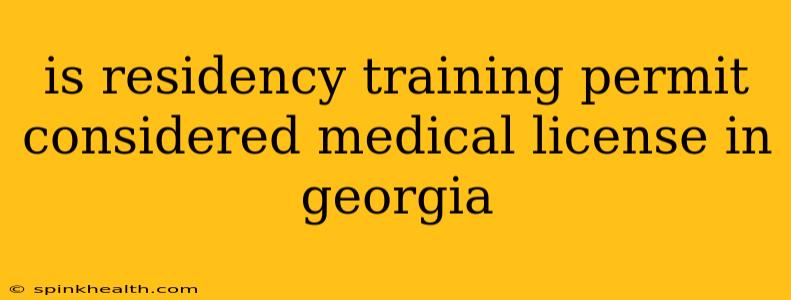Is a Residency Training Permit Considered a Medical License in Georgia?
The short answer is: No, a residency training permit in Georgia is not a medical license. It's a crucial distinction that impacts a physician's scope of practice and legal standing. Let's delve deeper into the nuances.
Imagine this: Sarah, a bright and dedicated medical graduate, has just begun her residency in internal medicine at a prestigious hospital in Atlanta. She's eager to put her medical knowledge into practice, but she's working under the close supervision of attending physicians. She's using a residency training permit, not a full medical license. This seemingly small difference holds significant weight.
What is a Residency Training Permit?
A residency training permit allows a recent medical school graduate to practice medicine in a supervised setting, specifically during their residency training. It's a conditional permission granted by the state medical board, allowing them to perform medical procedures and provide patient care under the direct or indirect supervision of licensed physicians. Think of it as a learner's permit for driving—it allows you to practice under specific conditions, but you can't operate independently.
What is a Georgia Medical License?
A Georgia medical license, on the other hand, is the full authorization to practice medicine independently in the state. It signifies that the physician has met all the requirements set by the Georgia Composite Medical Board, including completing medical school, residency, passing exams, and undergoing background checks. License holders have the authority to establish their own practice, prescribe medications independently, and perform procedures without the same level of direct supervision required of those with permits.
What are the Key Differences?
The core difference lies in independent practice. A residency training permit restricts practice to a supervised environment, while a medical license grants the authority to practice autonomously. This difference is crucial for legal and liability reasons. A licensed physician carries full responsibility for their actions, while a resident's actions are often under the purview of their supervising physician.
Can a Resident in Georgia Practice Without Supervision?
Absolutely not. A residency training permit explicitly limits practice to a supervised context. Attempting to practice independently while possessing only a residency training permit would be a violation of Georgia law, leading to severe consequences.
What Happens After Residency?
Upon successful completion of residency and fulfillment of all other requirements, the resident applies for a full Georgia medical license. This marks a significant transition, granting the physician full independent practice privileges.
What if a Resident Makes a Mistake?
If a resident makes a mistake during their training, the responsibility often falls on the supervising physician. This highlights the importance of the supervisory structure inherent in the residency training program. However, gross negligence or willful misconduct on the part of the resident could have significant legal ramifications.
Is a Residency Training Permit Enough to Practice Medicine in Georgia?
No. A residency training permit is a temporary permission to practice under direct supervision, not a license for independent practice. A full medical license is necessary for autonomous practice in Georgia.
In conclusion, understanding the difference between a residency training permit and a medical license in Georgia is essential for both residents and the public. The permit facilitates training, while the license represents the culmination of medical education and the legal authority to practice independently.

